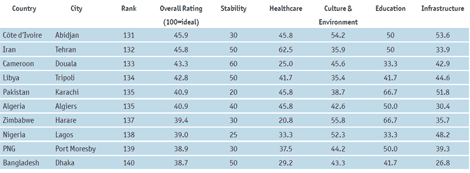What property investors can buy in the least liveable cities in the world: Six to 10

The least liveable cities in the world may not the first place an investor may look to buy but who ever said conventional wisdom is the best wisdom?
Property Observer at what’s available for property investors in the world’s least liveable cities: number one, Dhaka, Bangladesh two, Port Moresby, Papua New Guinea, three, Lagos, Nigeria, four, Harare, Zimbabwe and five, Algiers, Algeria.
Click to enlargeThe Economist Intelligence Unit’s Liveability Survey assesses the locations around the world that provide the best or the worst living conditions.
The survey doesn’t include the absolute worst of the worst, just cities or business centres that people might feasibly want to live in or visit. So it does not include cities like Kabul in Afghanistan or Baghdad in Iraq, both in the grip of conflict.
Conflict is generally found to be the primary reason for the position of the bottom ranked cities.
“Threat of armed conflict will not just cause disruption in its own right, it will also damage infrastructure, overburden hospitals, and undermine the availability of goods, services and recreational activities,” the report says.
Africa and Asia are home to all 13 cities in the bottom tier, with violence from crime, civil insurgency, terrorism or war playing a strong role in keeping them at the bottom of the pack.
10. Abidjan
Abidjan in Côte d’Ivoire is the best of the worst. None of the ratings given by The Economist for things like healthcare, culture and environment, stability and education are too low except for stability, which is particularly low, on par with Harare.
The city is the former capital of Côte d’Ivoire and remains the financial centre. It’s the third largest French-speaking country in the world and has a population of more than 5 million people.
A lot of the industry of the city comes from oil and manufacturing.
The main threats come from civil unrest and crime. It has improved recently, however, with the arrest of former president Laurent Gbagbo and the swearing in of President Alassane Ouattara.
However, there is still violence in the country.
“On 19 July 2012, there were violent attacks in the western towns of Duekoue and Nahibly, including at an internally displaced persons camp in Nahibly. And in June 2012 several alleged militia attacks resulted in numerous casualties in the western region, including seven United Nations peacekeepers and nine other people who were killed near the town of Tai close to the Liberian border,” the Australian Department of Foreign Affairs and Trade (DFAT) says.
Crime is the main threat in the cities.
“Car- and bus-jackings are common, and checkpoints and roadblocks may be encountered. You should avoid confrontations with police and security forces. Armed robbery is common, including of businesses and restaurants. Some robbers have been reportedly wearing military uniforms.
“We advise you not to walk across the De Gaulle and Houphouet-Boigny bridges in Abidjan as pedestrians have been attacked and robbed even during the day.”
A five-bedroom duplex with a swimming pool (picutred below) costs $382,000. It is more than 1,200 square metres and comes with two living rooms and a large garden.
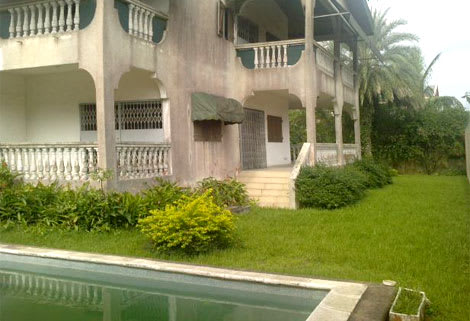
A three-bedroom apartment with access to a pool (pictured below) is being rented for $1,091 per month.
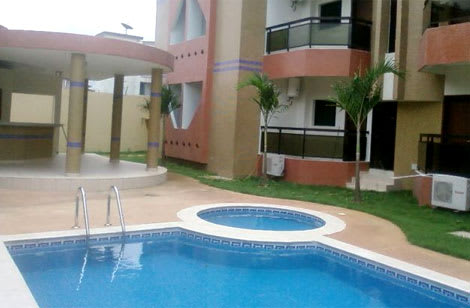
9. Tehran
Tehran, the capital of Iran, is a big, sprawling, smoggy hot city with some of the best healthcare in the bottom 10 cities in the world. It falls down with its poor infrastructure and low ratings for culture and environment, according to The Economist. It’s probably not being helped by years of trade embargos.
Smart Traveller warns that most of the dangers come from civil unrest in the country, which are quickly and violently put down.
“Since the Iranian presidential election in June 2009 there has been heightened political tension and an unpredictable security situation. Large demonstrations and violent clashes, resulting in some deaths, have taken place in Tehran and other cities in Iran. Further incidents are possible. You should monitor developments closely and avoid any demonstrations or political gatherings,” says the site.
The metro area has a population of 13 million people – it’s the 13th largest city in the world. The city is home to countless sites of historical significance, but modern developments have taken their toll.
Bloomberg reports the average cost of residential property in the city is about $1,550 per square metre. It reports in affluent northern Tehran prices can rise to about $11,500 per square metre.
Prices have been booming in the city, which has led to tighter government controls on the sector. Measures have been taken to prevent speculation, barring the resale of homes within fixed time limits.
A three-bedroom, three bathroom apartment in Sanad is being sold for $850,000. The glitzy-looking apartment (pictured below) has access to a pool and a spa.

A larger, 400-square-metre, three-bedroom apartment (pictured below) is being sold for $930,515 and comes with amazing views of sprawling Tehran.
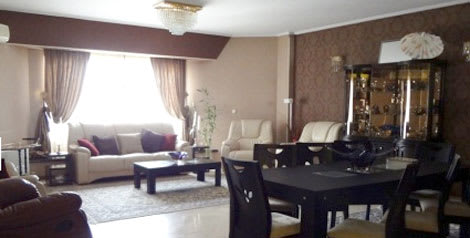
8. Douala
Douala in Cameroon is next, with reasonably high stability but very poor healthcare and education options, according to The Economist. In 2008 it had a population of 3 million people. The DFAT warnings for the country are relatively tame compared with some of the other offerings on the list.
“Criminal activity is a serious problem throughout Cameroon. Violent crime is common in residential centres and on rural highways. Armed highwaymen operate throughout the country.”
“Carj-ackings, muggings, robberies and petty theft occur in the capital city, Yaounde, and in the regional cities of Douala, Kribi and Maroua.
“There have been several incidents of robbery and rape committed against foreigners in Douala. Avoid travel after dark. There have been a number of attacks by gangs of armed gunmen on restaurants and hotels known to be used by foreigners.”
All in all, not as bad as it could be.
The country is bordered by Nigeria, Chad, the Central African Republic, Equatorial Guinea, Gabon and the Republic of the Congo.
The country runs close ties with France although corruption is pervasive at all levels of government.
A nine-bedroom, six-bathroom mansion in the city is being sold for around $727,000. It comes with two living rooms, a swimming pool and two-metre barbed-wire fence.

For those with a smaller budget, a 714-square-metre villa (pictured below) is being sold for around $110,000.
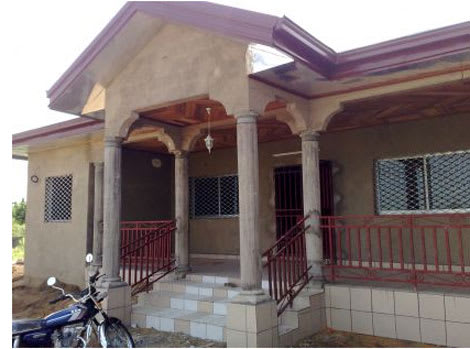
7. Tripoli
Tripoli was recently the site of a massive armed revolution helped by NATO airstrikes and a well-supplied citizen army. Since this however, Libya now has a relatively high stability rating considering it’s in the bottom 10 cities. The culture and environment rating is what brings it down, as well as healthcare and education opportunities.
An interim government was announced in November 2011, but violence does continue in the country.
Smart Traveller warns there are sporadic clashes between rival armed militias across Libya.
“Australians should be aware of the possibility of retaliatory measures from pro-Qaddafi supporters,” the site warns.
“The fighting in Libya has placed severe strain on public services, especially hospitals, clinics and provision of clean water.”
Prior to his untimely death at the hands of revolutionaries, Muammar Qaddafi reportedly used to offer about $45,000 to all newlyweds to buy their first home and all loans were interest-free.
One can only assume that deal has since lapsed.
In the Alsyahya area of Tripoli a nine-bedroom marble-floored villa (pictured below) is being sold for $2.65 million. The 1992-built villa is on 1,000 square metres and comes with parking for five cars.


6. Karachi
Karachi in Pakistan is the sixth least liveable city in the world, with even less stability than Nigeria. The city scores poorly for culture and environment, but education and infrastructure are higher than the others at the bottom end, according to The Economist.
Smart Traveller warns there is a very high threat of terrorist attacks in the country, with kidnapping and sectarian violence rife in the country. The website recounts numerous recent attacks in Karachi.
“Since January 2011, hundreds of civilians have been killed in Karachi as a result of political, sectarian and gang violence. In the first week of July 2011 a large number of people were killed in the ongoing violence. Political and sectarian violence occurred in Karachi in October 2011 and caused a number of deaths. Further violent clashes may occur.”
The town is the financial centre of Pakistan and the largest city in the country with a population of more than 21 million people. Locally it’s known as the city of the lights.
The nicest area is generally considered to be in South Karachi, in the downtown area.
A five-bedroom, six-bathroom townhouse in Clifton, in South Karachi (pictured below), is being sold for $261,970. In a gated community, the home has been “recently updated with porcelain tiles, complete new electrical/plumbing, bath tiles”. It has two modern kitchens. “This area has ample water as well,” the listing says.

